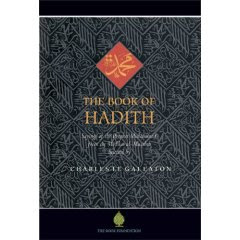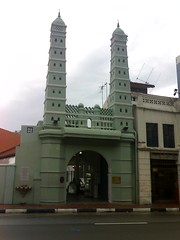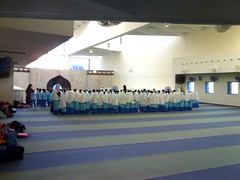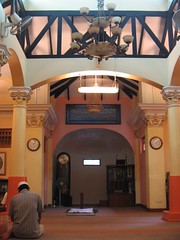
Chinese New Year is coming, and Chinatown is gearing up for it.
I walked through a Chinatown street just now to get to the subway from my office, and walked gingerly past a long row of pork sausage stalls trying to avoid contact. Yes, it is in the air .... the war between pigs and the Chinese.
Muslims had just commemorated their new year, and it is based on the lunar month calendar system. The Chinese have a combined lunar-solar calendar.
For convenience, here are the dates of the Chinese festivals coming up (from wikipedia) -
Holidays
The Chinese calendar year has nine main festivals, seven determined by the lunisolar calendar, and two derived from the solar agricultural calendar. (Farmers actually used a solar calendar, and its twenty-four terms, to determine when to plant crops, due to the inaccuracy of the lunisolar traditional calendar. However, the traditional calendar has also come to be known as the agricultural calendar.) The two special holidays are the Qingming Festival and the Winter Solstice Festival, falling upon the respective solar terms, at ecliptic longitudes of 15° and 270°, respectively. As for all other calendrical calculations, the calculations use civil time in China, UTC+8.
| Date | English Name | Chinese Name | Remarks | 2008 | |||
|---|---|---|---|---|---|---|---|
| month 1 day 1 | Chinese New Year (Spring Festival) | 春節 chūnjié | Family gathering and festivities for 3–15 days | Feb 7 | |||
| month 1 day 15 | Lantern Festival | 元宵節 yuánxiāojié | Yuanxiao eating and lanterns | Feb 21 | |||
| Apr 4 or 5 | Qingming Festival (Clear and Bright) | 清明節 qīngmíngjié | Tomb sweeping | Apr 4 | |||
| month 5 day 5 | Dragon Boat Festival | 端午節 duānwǔjié | Dragon boat racing and zongzi eating | Jun 8 | |||
| month 7 day 7 | Night of Sevens | 七夕 qīxī | For lovers, like Valentine's Day | Aug 7 | |||
| month 8 day 15 | Mid-Autumn Festival (Moon Festival)[1] | 中秋節 zhōngqiūjié | Family gathering and moon cake eating | Sep 14 | |||
| month 9 day 9 | Double Ninth Festival (Double Yang) | 重陽節 chóngyángjié | Mountain climbing and flower shows | Oct 7 | |||
| month 10 day 15 | Xia Yuan Festival | 下元節 xiàyuánjié | Pray for a peaceful year to the Water God | Nov 12 | |||
| Dec 21 or 22 | Winter Solstice Festival | 冬至 dōngzhì | Family gathering | Dec 21 | |||
| month 12 day 23 | Kitchen God Festival | Jan 18 |
Point to note - the Lantern Festival mentioned above is not the same as the one celebrated in Singapore, which is known as the Mid-Autumn Festival in China. The Chinese in Singapore do not observe the Lantern Festival mentioned above.
Tomorrow is Thaipusam. I have not seen one of those in a long time. When I was in secondary school, my school was located at Serangoon Road, and the whole region would be congested with kavadi carriers and their supporters. It was an experience, really.
This reminds me of why I love being in Singapore. So many cultures, so many faiths, and nobody bugs you about yours.
Alhamdulillah.















